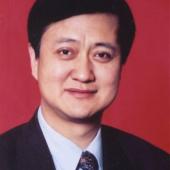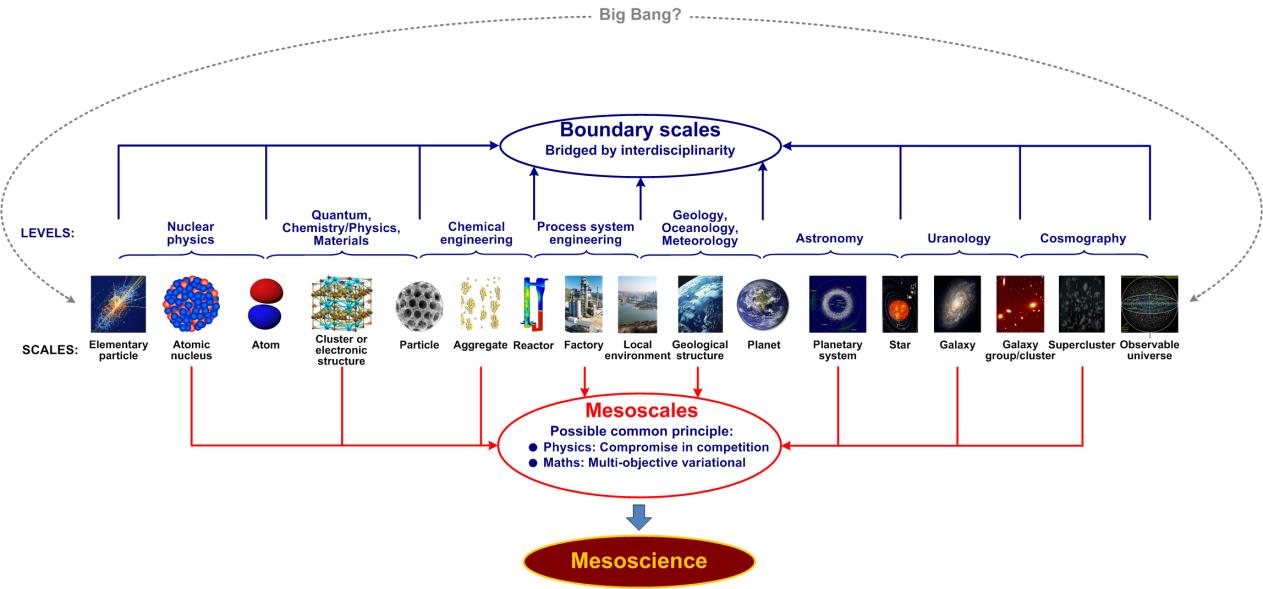
Join us for the second Monday Plenary at the 8th World Congress on Particle Technology with featured plenary speaker Jinghai Li, Professor & Vice President at the Chinese Academy of Sciences. Jinghai Li will be presenting "Mesoscience: Opening a New Paradigm of Particle Technology."
Mesoscience: Opening a New Paradigm of Particle Technology
Jinghai Li, Professor & Vice President, Chinese Academy of Sciences
Mesoscale phenomena exist in between “unit” scales and “system” scales at different levels of the real world, spaning from elemental particle to the universe, as indicated in the following Figure[1]. Understanding of complex processes at mesoscales, characterized by spatiotemporal dynamic structures, is a common challenge for the whole spectrum of science and technology.
This presentation reviews the three decades of research on mesoscales of particulate systems at IPE-CAS. It was initiated by the energy-minimization multiscale (EMMS) model specific for gas-solid fluidization[2], which established the stability condition or variational function for particle clustering phenomenon. In extending the model to many different complex systems, such as gas-liquid, turbulence, gas-liquid-solid, emulsion, material preparation, protein, and catalysis systems, the EMMS principle was then proposed generally for different complex systems, featuring compromise in competition between different dominant mechanisms in physics and formulated as multi-objective variational problem in mathematics[3]. With increasing understanding of the generality of this principle, the concept of mesoscience was further advanced[4, 5], and is believed to be potentially universal for all complex mesoscale phenomena at different levels.

The presentation will also give a perspective on mesoscience. It is believed that more evidence will be needed from various disciplines[4, 5], particularly, from the field of particle technology where mesoscale phenomena occur everywhere such as in formulating and processing particles. The development of mesoscience will enable our capability in particle design, rational synthesis, smart massive production and system optimization due to its underlying principle to bridge unit scales and system scales. In contributing more evidence to mesoscience in exploring its universality, in return, the knowledge, tools and methods in particle technology will be upgraded to a new paradigm[6]. In such a paradigm, the theory, computation and experiment at mesosclaes will be dominant, and the virtual process engineering will be enabling[7, 8].
References:
1. J. Li, W. Ge W. Wang, N. Yang, W. Huang, Focusing on mesoscales: from the energy-minimization multiscale model to mesoscience, Current Opinion in Chemical Engineering, 2016, 13: 10-23.
2. J. Li, Y. Tung, M. Kwauk, Method of energy minimization in multi-scale modeling of particle fluid two-phase flow, Circulating Fluidized Bed Technology II, Basu and J. F. Large (eds), Pergamon Press, 1988, 89-103.
3. J. Li, J. Zhang, W. Ge, X. Liu, Multi-scale methodology for complex systems, Chemical Engineering Science, 2004, 59(8-9): 1687-1700.
4. J. Li, W. Ge, W. Wang, N. Yang, X. Liu, L. Wang, X. He, X. Wang, J. Wang, M. Kwauk, From multiscale modeling to meso-science -- a chemical engineering perspective, Springer, Berlin, 2013.
5. J. Li, W. Huang, Towards mesoscience: the principle of compromise in competition, Springer, 2014.
6. J. Li, Exploring the logic and landscape of the knowledge system: multilevel structures, each multiscaled with complexity at the mesoscale, Engineering, 2016, 2: 276-285.
7. W. Ge, W. Wang, N. Yang, J. Li, M. Kwauk, F. Chen, J. Chen, X. Fang, L. Guo, X. He, X. Liu, Y. Liu, B. Lu, J. Wang, J. Wang, L. Wang, X. Wang, Q. Xiong, M. Xu, L. Deng, Y. Han, C. Hou, L. Hua, W. Huang, B. Li, C. Li, F. Li, Y. Ren, J. Xu, N. Zhang, Y. Zhang, G. Zhou, G. Zhou, Meso-scale oriented simulation towards virtual process engineering (VPE) -- the EMMS paradigm, Chemical Engineering Science, 2011, 66: 4426-4458.
8. X. Liu, L. Guo, Z. Xia, B. Lu, M. Zhao, F. Meng, Z. Li, J. Li, Harnessing the power of virtual reality, Chemical Engineering Progress, 2012, 108: 28-33.
